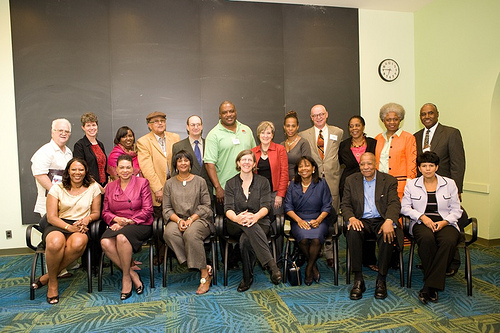
|
Symposiums |
 Facebook Facebook |
|
Sept. 21, 2009 Symposium
Undoing Racial Disproportionality in Child Welfare 5 part webinar series
Safely reducing the number of children in foster care by 50 percent by the year 2020
Kentucky parents campaign for Undoing Racism within the Kentucky Foster Care System-Parents Work with PolicyMakers
County Partners with Public Schools & Healthcare regarding reporting

See all the photos - click here
Symposium Feedback From Attendees
Child Welfare Book Child Welfare and Racism pdf format Symposium Addresses Racial Disproportionality in Child Welfare pdf format
Summary and Conclusions Though significant gains have been made in eliminating disproportionality within the Texas child welfare system, it still remains an issue that needs to be addressed. The disproportionate number of African American and Hispanic children reported is reduced by screening at intake. Removals, regardless of investigation substantiation rates or risk rates, also show a higher rate for African American children (1.22 down from 1.42 in 2005) and Native American children (1.53 down from 1.62 in 2005) than for Anglo or Hispanic children and child safety appears not to be affected. These changes appear to be located in the larger counties of the state where the more intense efforts at reducing disproportionality are located. Furthermore, exits from substitute care for African American and Hispanic children have improved when their family members participate in Family Group Conferences. These findings suggest that changes in the Texas child welfare system of care have positively impacted children and families. Significant gains have been made in reducing the widespread disproportionality within the Texas child welfare system. The reductions may seem small but it must be kept in mind that the disproportionality within the child welfare system is a systemic problem that will not be resolved overnight. The higher rate of removals for African American children and lower rate of exits results in a greater number of African American children in the Texas child welfare system. The system remains disproportionate due to these differences. Increased effort at providing kinship care and reunifications has resulted in an overall decrease in the existing number of children in substitute care, including African American and Hispanic children. Family Group Decision-Making Conferences are offered to every family in an effort to involve the family in their service plan and to safely prevent removals from occurring and safely speed reunification. These conferences are making an important impact on families with drug problems, which slow exits from substitute care. The kinship program has also positively impacted the number of exits to kinship placements for all groups. Importantly, disproportionate exits to kin placements for African American and Hispanic children have been eliminated since the beginning of this initiative. More work needs to be accomplished to reduce the amount of time in substitute care for children who do not have the option of reunification or kinship care. For these children, adoption or aging out of substitute care (the slowest exits) are the only options. The effect of current interventions that are underway will be examined in future evaluations. These future evaluations will include testing the impact of cultural awareness training on caseworker's actual decisions. Training itself will also be supported by incorporating the current findings from the Decision-Making Ecology. One of these findings suggests that a better understanding of the relationship between risk, race, and poverty would be helpful. Other findings show the more African American or Hispanic families a child welfare worker has on their caseload, the lower disproportionate removals. This indicates that greater exposure to these cultures through training may be needed. Findings from the Decision-Making Ecology have implications beyond training. Those indicating that caseworkers were more likely to make removals when they thought local services were inadequate suggest that they may opt for a removal because it may be the only viable option when action needs to be taken. What is needed is to understand further what these inadequacies might be (e.g., availability, accessibility, etc.). The finding indicating that Family Group Conferences are effective with families with drug problems and that children tend to exit to relatives under these circumstances needs to be better understood. It may be the case that including the relatives of the caregivers in these conferences affords all of the family members a way out of these circumstances with the best interests of the child in the forefront. CPS is committed to continuing its efforts to improve outcomes for all children in the Texas child welfare system and will work to eliminate disparities experienced by those children and families.
|
||
|
CONTACT
|
||
 Facebook Facebook |



